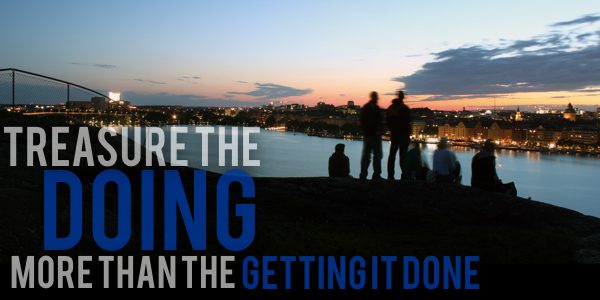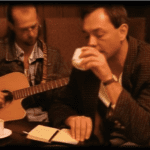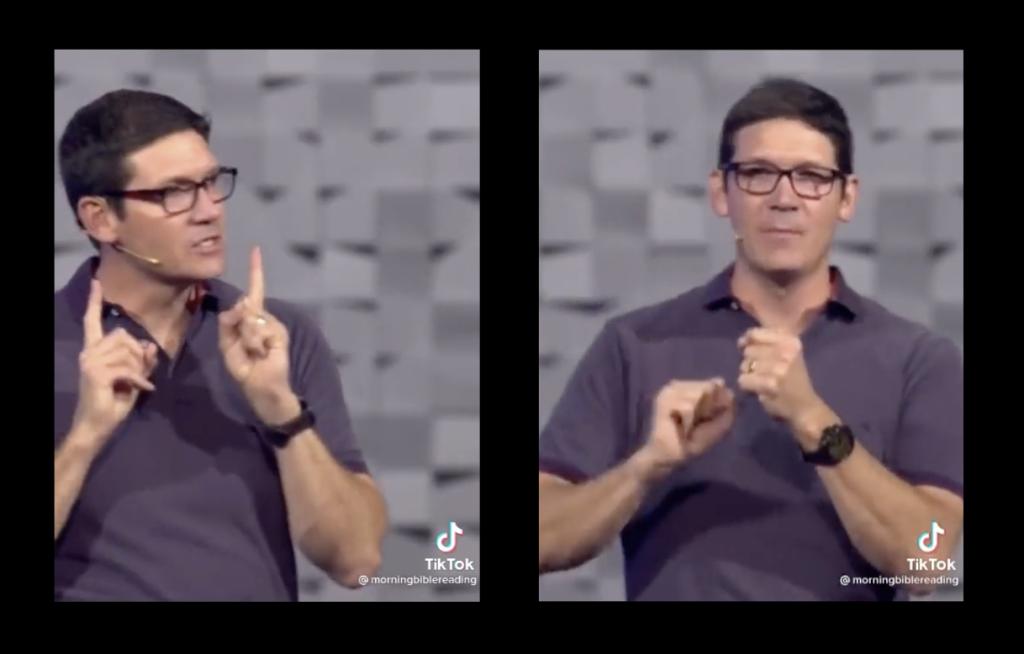 The source of nearly all human misery can be traced back to an often unconscious disconnection between the ends and the means. When humans treat other people, or the planet, or our own bodies as if they are nothing more than a means to an end, then we invite suffering into our lives. If we are ever to have an impact for the better on the plight of this world, surely this will involve the ability to treasure the doing, more than the getting it done.
The source of nearly all human misery can be traced back to an often unconscious disconnection between the ends and the means. When humans treat other people, or the planet, or our own bodies as if they are nothing more than a means to an end, then we invite suffering into our lives. If we are ever to have an impact for the better on the plight of this world, surely this will involve the ability to treasure the doing, more than the getting it done.
Think of the emphasis most organizations place on the achievement of their own goals—the agenda, the mission, the outcomes—keep your eyes on the prize and then do whatever it takes to succeed. If the ends are all-important, then nearly any means can be justified. This path is uncritically taken by businesses and churches alike: do whatever it takes to succeed. With our eyes on the prize we have no time to think about collateral damage, much less the unintended consequences. Any organization that ascribes to this philosophy will leave a trail of broken bodies in its wake.
I would contend that this is precisely the power of the goal or mission statement within most organizations: they artificially inflate outcomes to the point that people will chase them by any means necessary.
Perhaps even more tragically, our attempts to control outcomes by any means necessary serves to steal away the joy of the present moment. The focus is out there in the future, invested in some reality that does not yet exist. That in itself is not a bad thing, unless the focus on the future serves to eliminate one’s ability to enjoy the moment, and to inhabit the moment with great care. Those who do not learn to patiently inhabit the present moment will end up doing great damage.
This ability to be less invested in controlling the future is what the great Duke University theologian and ethicist Stanley Hauerwas calls “becoming a friend of time.” Hauerwas asserts that people can best learn this discipline when we are placed in a situation over which we have no real control… terminal cancer, natural disasters, or rebellious children.
The moment we realize that we have precious little control over the outcomes of our life is the moment we surrender to time, and learn to become its friend. The moment we realize that, although we could marshall all our strength and resources we still cannot dictate the outcomes of our lives, that is the moment when we become fully human. That is when I truly become a creature of this earth, not the master and commander. That is when I realize that I am not the master of my fate; I am not the captain of my soul. I am a creature, not a creator.
The problem is, you have to want it. You have to want to be a creature in this world. You have to want to become a friend of time, and all too many people who inhabit leadership positions in our world would rather try to play God. It’s never a good trade to barter away the present for the hope of some desired future. All true stewardship is a stewardship of the present in light of the future, not a stewardship of the future at the expense of the present. The latter approach usually ends up costing you both the future and the present.
When we emphasize not the ends, but the means—the process, the journey, the day to day practices and habits of our lives—then we are able to enjoy life and experience peace no matter the outcomes. We have a saying at my church: how we get there is where we are going. The journey is the destination. Anna Quindlen noted this about her time as a parent of young children: “I wish I had treasured the doing a little more and the getting it done a little less.”
This language developed in our community as a reaction to the fact that it is often difficult to live in fidelity to other people who are broken, who hurt and disappoint one another as a matter of course. It also comes as a byproduct of caring for the poor. Make loving your neighbor your primary concern and you are sure to experience a budget shortfall. Translation: the ends don’t always meet their means. All the goals in the world cannot change this reality. It is simply part of the human condition.
So, what do we do when we realize that we can’t save our neighbors just down the street, much less the planet? We do very small things. Forgive quickly. Speak less and listen more. Seek justice. Love mercy. Walk humbly with your God. We try our best to treasure the doing more than the getting it done.
















